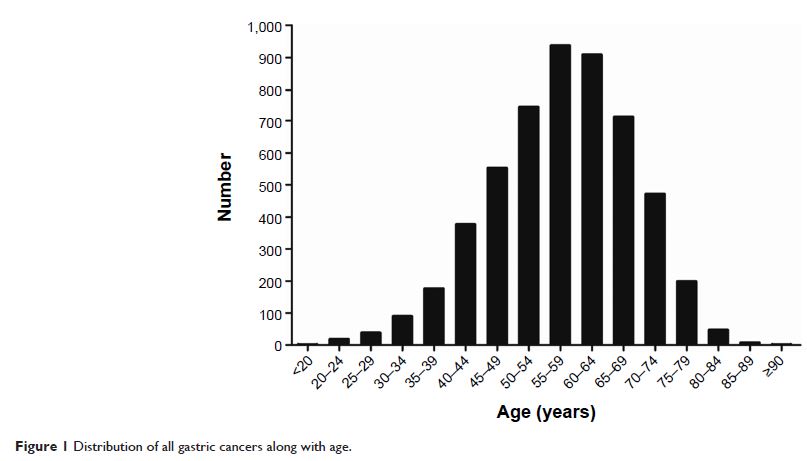108985
论文已发表
注册即可获取德孚的最新动态
IF 收录期刊
- 3.4 Breast Cancer (Dove Med Press)
- 3.2 Clin Epidemiol
- 2.6 Cancer Manag Res
- 2.9 Infect Drug Resist
- 3.7 Clin Interv Aging
- 5.1 Drug Des Dev Ther
- 3.1 Int J Chronic Obstr
- 6.6 Int J Nanomed
- 2.6 Int J Women's Health
- 2.9 Neuropsych Dis Treat
- 2.8 OncoTargets Ther
- 2.0 Patient Prefer Adher
- 2.2 Ther Clin Risk Manag
- 2.5 J Pain Res
- 3.0 Diabet Metab Synd Ob
- 3.2 Psychol Res Behav Ma
- 3.4 Nat Sci Sleep
- 1.8 Pharmgenomics Pers Med
- 2.0 Risk Manag Healthc Policy
- 4.1 J Inflamm Res
- 2.0 Int J Gen Med
- 3.4 J Hepatocell Carcinoma
- 3.0 J Asthma Allergy
- 2.2 Clin Cosmet Investig Dermatol
- 2.4 J Multidiscip Healthc

老年胃癌患者的临床病理特征及预后分析: 一个回顾性队列研究
Authors Xu G, Feng F, Liu S, Wang F, Zheng G, Wang Q, Cai L, Guo M, Lian X, Zhang H
Received 25 September 2017
Accepted for publication 25 January 2018
Published 12 March 2018 Volume 2018:11 Pages 1353—1362
DOI https://doi.org/10.2147/OTT.S152471
Checked for plagiarism Yes
Review by Single-blind
Peer reviewers approved by Dr Amy Norman
Peer reviewer comments 2
Editor who approved publication: Dr Carlos Vigil Gonzales
Background: Little is known about the clinicopathological features and prognosis in
elderly gastric cancer (GC) patients aged 65–79 years. The aim of this
study was to evaluate clinicopathological features and prognosis in elderly GC
patients.
Patients and
methods: From May 2008 to December 2014, a
total of 5,282 GC patients were enrolled in our present study. Patients were
divided into elderly and middle-aged groups. The clinicopathological features
and clinical outcomes were analyzed.
Results: The proportion of dysphagia was significantly higher in elderly
patients than that in middle-aged patients (P =0.002), whereas
the proportion of abdominal pain and heartburn was significantly lower in
elderly patients than that in middle-aged patients (P <0.001
vs P =0.038, respectively). The
proportion of patients with carbohydrate antigen (CA) 19-9 was significantly
higher in elderly patients than that in middle-aged patients (P =0.009). There was no significant
difference in clinicopathological features between elderly and middle-aged
patients with D2 gastrectomy (all P >0.05). Age,
tumor size, histological type, tumor depth, lymph node metastasis,
carcinoembryonic antigen, alpha fetoprotein, CA19-9, and CA125 were independent
risk factors for the prognosis of GC patients in univariate and multivariate
analyses. Overall survival in elderly patients was significantly reduced
compared with middle-aged patients (P =0.001),
especially in patients with tumor size >5 cm (P =0.002), poorly differentiated
tumor (P <0.000), stage III tumor (P =0.002), or normal levels of
carcinoembryonic antigen (P =0.009), alpha
fetoprotein (P =0.002), CA19-9 (P =0.002), and CA125 (P =0.004).
Conclusion: The clinicopathological features of elderly patients were
different to those of middle-aged patients. The prognosis for elderly GC
patients was significantly worse than for middle-aged patients.
Keywords: gastric cancer, elderly, clinicopathological features, prognosis
